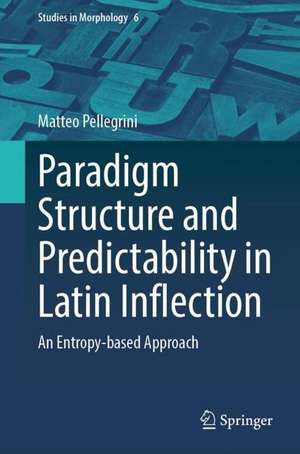Paradigm Structure and Predictability in Latin Inflection: An Entropy-based Approach: Studies in Morphology, cartea 6
Autor Matteo Pellegrinien Limba Engleză Hardback – apr 2023
Latin paradigms are almost proverbially known, and they have often been used as a test case for different theoretical approaches to morphological complexity. This book analyses them in a completely word-based perspective, using a recently developed information-theoretic methodology, making entropy-based techniques of analysis available to a wider readership. By doing so, it shows the relevance of traditional notions like principal parts, giving them a more principled, data-driven formulation. Furthermore, it suggests enhancements to the standard information-theoretic methodology, allowing to account for the role of external factors – like gender and derivational information – in improving predictability between inflected word forms. This book is useful to morphologists, that will see ideas and techniques taken from the current debate on morphological theory tested on complex phenomena of a language as renowned as Latin. It is also helpful for scholars working in both Latin and Romance linguistics: the former will find a freely available lexical resource and a novel description of Latin paradigms, that can be exploited by the latter to draw a comparison with recent analyses of the inflectional morphology of several Romance languages.
Preț: 698.30 lei
Preț vechi: 821.53 lei
-15% Nou
Puncte Express: 1047
Preț estimativ în valută:
133.64€ • 138.05$ • 111.22£
133.64€ • 138.05$ • 111.22£
Carte tipărită la comandă
Livrare economică 25 martie-08 aprilie
Preluare comenzi: 021 569.72.76
Specificații
ISBN-13: 9783031248436
ISBN-10: 3031248430
Pagini: 183
Ilustrații: XIII, 183 p. 1 illus.
Dimensiuni: 155 x 235 mm
Greutate: 0.46 kg
Ediția:2023
Editura: Springer International Publishing
Colecția Springer
Seria Studies in Morphology
Locul publicării:Cham, Switzerland
ISBN-10: 3031248430
Pagini: 183
Ilustrații: XIII, 183 p. 1 illus.
Dimensiuni: 155 x 235 mm
Greutate: 0.46 kg
Ediția:2023
Editura: Springer International Publishing
Colecția Springer
Seria Studies in Morphology
Locul publicării:Cham, Switzerland
Cuprins
Chapter 1. The theoretical framework.- Chapter 2. The method.- Chapter 3. The data and the tools.- Chapter 4. Predictability and paradigm organization in Latin verb inflection.- Chapter 5. Predictability in Latin noun inflection and the role of gender.- Chapter 6. The impact of derivational relatedness on inflectional predictions.- Chapter 7. Conclusions.
Notă biografică
Matteo Pellegrini is postdoctoral researcher at the CIRCSE Research Centre of the Università Cattolica del Sacro Cuore in Milan. He has completed a joint PhD program at the Universities of Bergamo and Pavia. His master thesis has been awarded a mention among the best dissertations of the University of Torino for the academic year 2014/15. He is especially interested in theoretical morphology, that he has investigated extensively for Latin and Italian.
Textul de pe ultima copertă
Latin paradigms are almost proverbially known, and they have often been used as a test case for different theoretical approaches to morphological complexity. This book analyses them in a completely word-based perspective, using a recently developed information-theoretic methodology, making entropy-based techniques of analysis available to a wider readership. By doing so, it shows the relevance of traditional notions like principal parts, giving them a more principled, data-driven formulation. Furthermore, it suggests enhancements to the standard information-theoretic methodology, allowing to account for the role of external factors – like gender and derivational information – in improving predictability between inflected word forms. This book is useful to morphologists, that will see ideas and techniques taken from the current debate on morphological theory tested on complex phenomena of a language as renowned as Latin. It is also helpful for scholars working in both Latin and Romancelinguistics: the former will find a freely available lexical resource and a novel description of Latin paradigms, that can be exploited by the latter to draw a comparison with recent analyses of the inflectional morphology of several Romance languages.
Caracteristici
A novel quantitative analysis of Latin paradigms that makes state-of-the-art inflection modeling more widely available Recovers ideas of traditional Latin grammars within a more principled, data-driven framework Introduces methodological innovations in well-established entropy-based techniques of morphological analysis





